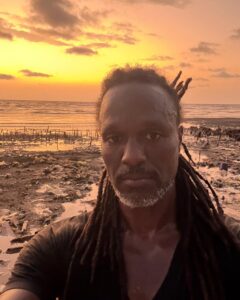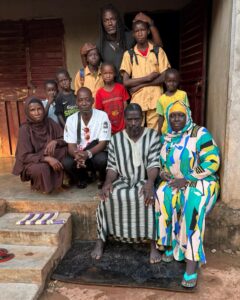This Pillow Pick was written by Jeffrey Page and published on November 1, 2024.
Jeffrey Page is an Emmy Award-nominated director and choreographer, and a
long-time collaborator, friend, and trustee of Jacob’s Pillow. He is embarking on a
four-month research project to West Africa to uncover the embedded ‘technologies’ of rhythm, movement, and community inherent in the rich tapestry of African dance and music traditions. Each month, he’s sharing an update from his travels here on the Pillow blog.

In the heart of Guinea’s Kankan region lies Hamana, a treasure trove steeped in Malinké culture. My journey in the quaint village of Kato, flanked by Fissadu and Sangbarala—the home of legendary Djembe Fola, Famoudou Konaté—was a daily adventure on rugged trails by moto bike to explore the distinct dance styles of nearby Baro. Each village, while unified under the Malinké tradition, revealed unique stylistic nuances, reflecting their distinct identities. The rich gold deposits of the area, sifted and searched by villagers, added a literal and metaphorical shimmer to my explorations.
In Baro, I met a remarkable teacher, Kabinet Keita, known affectionately as “Baba.” Baba was not just a skilled dancer; his profound musicality ensured that each movement was a dialogue with the rhythm, pushing the boundaries of traditional dance into expressive artistry. Dancing with Baba was like watching a maestro at work, where the music and
dance were in beautifully climactic conversation.
Our sessions often took place in a secluded area that felt like an artist’s colony, designed specifically for Baro’s creative spirits. This clearing, swept free of debris, offered a soft, welcoming earth perfect for dancing barefoot, connecting me to the grounding energy of the land—a practice believed to transfer the earth’s electrons into the body, reducing inflammation and stress according to some studies.
My training sessions never failed to draw an audience, curious locals trying to place my familiar but also unfamiliar face within their world. Their speculations about my origins spanned from Guinea itself to Nigeria, a poignant reminder of the sprawling, often disconnected branches of our shared heritage. Revealing my African-American identity invariably shocked them, bridging a gap they hadn’t realized existed.
As the dance session drew to a close, one spectator—an older man dressed simply—remained intensely focused on our movements. Initially, due to a misunderstanding amplified by the language barrier, I mistook his intent; I thought he was merely seeking money. However, his true purpose was far more profound. He was extending an invitation to a sacred grove.

As we approached the grove, encased by towering Baobab trees near a tranquil body of water, the atmosphere thickened with a palpable sense of the mystical. What I assumed to be a quiet visit morphed suddenly as we entered the clearing. There, unexpectedly, a group of locals, including Baba, had gathered. They formed a circle and began chanting, their voices rising in a powerful crescendo around me.
Seated on a simple wooden stoop, with the elder by my side, the initial tranquility transformed into a heart-stopping moment. I was not merely a visitor; I had become the focal point of their prayers and spiritual energies. Surrounded by this unexpected congregation, their chants directed towards me, I felt a surge of connection and an intense shield of communal protection enveloping me. It was a profound spiritual embrace, linking me indelibly to the community’s soul.
Reflecting on these moments, I am reminded of Ralph Ellison’s “Invisible Man”—the quest for visibility isn’t just about being seen but about being recognized for one’s full humanity. In Hamana, amidst the Baobabs and on gold-laden soil, I found a visibility that transcended physical sight, tapping into the sacred rhythm of existence itself. Here, gold wasn’t just a mineral but a metaphor for the rich, often hidden layers of culture and history, urging us to dig deeper and appreciate the beauty beneath. In this sacred enclave, surrounded by history and watched over by the community, I truly danced on gold.